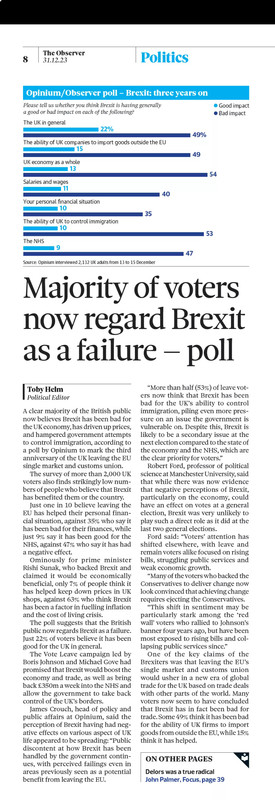Klopkoek Ja, maar daar gaat het hele rapport niet over. Het is weer zo'n typisch stukje economische voorspelling waar nul waarde aan valt te hechten. Inmiddels is de 'ranking' zelf ook gepubliceerd en het is dit flinterdunne stukje onderbouwing voor hun waarzeggerij:
The United Kingdom is a high-income country with an expected PPP-adjusted GDP per capita of
$56,836 in 2023. The economy is predominantly services-based. The UK economy ranks as the
world’s sixth largest as of 2023. 2024 will represent the fourth year since the UK’s departure from the
European Union (EU).The UK economy expanded by 4.3% on the year in 2022, reflecting the continued resurgence in
demand after pandemic-related disruption in the year prior. However, 2023 has been a year of
relative weakness. Growth is expected to have slowed to just 0.4%.
Various economic headwinds have contributed to the UK’s recent growth slowdown. Like much of the
global economy, the UK has contended with supply-side headwinds, notably from elevated input
prices and disruption to supply chains. These effects have translated into consumer price pressures.
In 2023, prices were up by an estimated 7.5% relative to the previous year, a slowdown relative to
2022’s inflation of 9.1%, but still firmly above historical averages.In response to elevated inflation, the Bank of England has acted similarly to other major central
banks by raising rates. In the space of just two years, the Bank of England’s base rate has been hiked
from a record low of 0.1% to 5.25%, where it is expected to remain until the middle of 2024. By
making borrowing more expensive, this tighter interest rate environment is discouraging investment
and spending, thereby contributing to weaker output. Higher interest rates are also expected to have
other effects on the UK economy, notably in the housing market, where prices have started to show
annual declines in recent months. Nevertheless, the tighter policy environment is having a tangible
impact on inflation, with price growth expected to slow further into 2024 and beyond.The growth slowdown in 2023 has been accompanied by a slight weakening of the labour market,
with the unemployment rate rising by 0.5 percentage points on the year. The unemployment rate is
still relatively low, however, at 4.2% across the year. This historically low rate has supported elevated
rates of nominal earnings growth. Though such rates are projected to slow next year, wage growth
becoming embedded into the economy could pose a risk to the inflation outlook, particularly for
services, given the outsized contribution of labour to business costs. The economy’s composition,
being majority services-based, makes the UK disproportionately exposed to this potential riskNominal wage growth has been strong in 2023. This has supported continually positive consumption
growth, albeit at a reduced rate. Certain industries have felt the slowdown in consumption growth
harder than others, with consumer-facing services being particularly impacted. For instance, retail
sales volumes are expected to have fallen over 2023.The effects of the economic headwinds contributing to the UK’s slowdown in 2023 are expected to
linger into 2024, leading to another year of relatively weak growth. Cebr projects the UK economy to
expand by just 0.5% next year. Relatively sharp growth of 1.9% is projected for 2025 as monetary
policy loosens, before the economy settles at an annual trend rate of between 1.6% and 1.8% for the
remainder of the forecast horizon. This trajectory would see the UK retain its WELT position of 6th.
Goed verhaal Hans, lekker kort.
En om de vluchtigheid van dit soort 'rapportjes' te illustreren:
One of the biggest changes since last year has been our view about China. Two years ago, we expected that it would overtake the US in 2028. Last year, we moved the forecast out to 2030. We now think that it will take until 2036 for China to overtake the US economy. This revised view reflects the increased hit to the Chinese economy from the country’s zero Covid policy, and increased trade tensions between China and the West.
Dit soort economische forecasts zijn bijna net zo betrouwbaar als weersvoorspellingen over het komende half jaar.
Het genereert allemaal lekker aandacht voor het denktankje wat ongetwijfeld weer een positief effect heeft op het aantal consultancyklusjes wat ze binnenharken, maar dit broddelwerkje bejubelen omdat het iets zou zeggen over de Brexit is natuurlijk volkomen lachwekkend.
Maar bovenal, je haalt zelf ook nog eens oorzaken aan die verder geen zak te maken hebben met de EU. Vergrijzing is een reden dat het BNP minder hard gaat stijgen of zelfs gaat dalen. Duitsland heeft een maakindustrie en geen dienstenindustrie wat tot enorme groei van de economie heeft geleid, maar wat juist nu problematisch kan worden. Frankrijk heeft een te grote overheid en te hoge belastingen volgens economen en ga zo maar door. Allemaal factoren die niets met de EU van doen hebben en al helemaal niet met het feit dat de EU een vehikel voor 'rechtse economische politiek' zou zijn, integendeel. Want laten we wel wezen, dat is de reden dat je hier weer loopt te fulmineren tegen de EU en de Brexit toejuicht.
